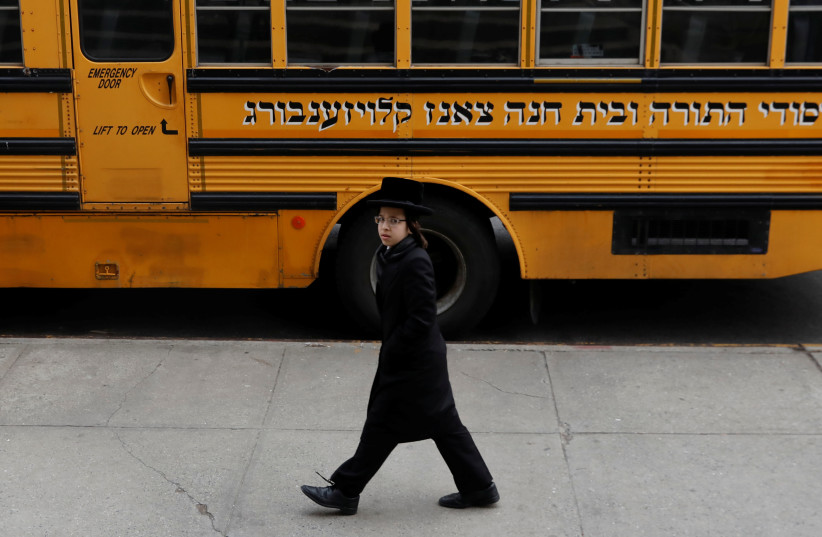When NASA’s Jessica Meir embarked on a journey to the International Space Station Expedition 61/62 as a flight engineer, Jewish and Israeli media outlets celebrated that she is, indeed, a female Jewish astronaut.
Yet Meir is only a patrilineal Jew – her father is an Iraqi Jew who moved to Israel as a child, and later to Sweden and the US. Meir’s Christian mother did not convert, but the family identified as Jewish and attended synagogue. “Personally, I’m not really a religious person,” she told JTA in 2019. “But I think that my Jewish cultural background is obviously a big part of my culture and especially traditions.” She identifies as Jewish, and celebrated her Bar Mitzvah in a synagogue.
Surprisingly, some of the Israeli media picked up on her mother not being Jewish, and then the framing of her personal story changed a bit. “An astronaut born to an Israeli father – is on the way to space,” was the headline of Israel’s most popular news site, Ynet. Religious news sites were a bit more conservative and considered Meir as the “daughter of a Jew.”
This is an astronaut who flew to space with a menorah, a Star of David and an Israeli flag, and even made a special effort to take a picture of Israel from space. Yet a large majority of Israeli Jews do not see her as one of them.
The Jerusalem Post published a survey on Tuesday that emphasized how opposite Israeli and American Jews are: 70% of Jews in Israel do not accept that someone can be Jewish by patrilineal descent, according to a new poll by the Israel Democracy Institute. Twenty-six percent say they do accept patrilineal descent, and 4% say that they don’t know.

The segmentation of the data according to religious definition shows that the more secular the public, the more it sees the children of a Jewish father as Jews, yet there is a small majority (50% compared with 44%) among this group who do not accept patrilineal descent.
Judaism traditionally holds that the Jewish identity can only be passed down through one’s mother, which is referred to as matrilineal descent. If only one’s father is Jewish, then they are not usually counted as Jewish.
In contrast, a large majority of American Jews actually consider a son or a daughter of a Jew as Jewish, regardless of what background is their mother.
According to the 2020 Pew Survey of Jewish life in the US, just over half of Jews who do not identify with any particular branch of Judaism say both of their parents are Jewish (52%), while one in five each say only their mother (22%) or only their father (21%) is Jewish. In addition, 28% of Reform Jews in the US, the largest affiliated religious stream, have only one Jewish parent.
Jews 65 and older are much more likely than those under 30 to say both of their parents are or were Jewish (89% vs. 49%). Indeed, 46% of the youngest Jewish adults (age 18-29) have only one Jewish parent, as do 37% of Jews in their 30s and 40s.
American vs Israeli views
Since 1983, the Reform movement officially accepted children born to a Jewish father regardless of the identity of the mother, as long as the children are raised Jewish and engage in Jewish life.
A 1995 study on Conservative Judaism in the US and Canada (Wertheimer, 1995) showed that 69% of respondents, members of Conservative congregations, agree that “anyone who was raised Jewish, even if his/her mother was Gentile and father was Jewish,” is Jewish. The Conservative movement still has not accepted Judaism by patrilineal descent, yet a majority of its members already 30 years ago considered them Jews.
These numbers emphasize even more why the split between American Jews and Israeli Jews will, unfortunately, continue to grow. These trends are rooted in both the cultures of Israel and the US, and there are multiple reasons why each side is becoming more extreme. There are those who blame the Chief Rabbinate for this trend, but does that explain why the Israeli branch of the Reform movement will not accept Jews of patrilineal descent?
The issue of intermarriage
As opposed to the Reform movement in the US, Israel Reform Judaism also forbids intermarriage.
“We do not officiate weddings of interfaith couples,” Beit Daniel, a Reform congregation in Tel Aviv, says on its website. “Both [spouses] must be Jewish through lineage or conversion.”
The site notes that “even a person whose father is Jewish (but whose mother is not Jewish) must undergo a conversion process,” and that they offer “unique courses and study sessions for those whose father is Jewish and who was educated within the Israeli education system.”
What we learn from this fascinating difference between Jews in the world’s two largest Jewish communities is the following: secular and even Reform Jews in Israel are more religious than their American counterparts. In the US, it seems as though most Jewish groups are more liberal, with mainstream haredi Americans usually more open-minded than Israeli haredim. American haredim may go to a baseball game or earn a college degree, whereas Israeli haredim are a lot more conservative on these matters. Reform and even Conservative Jews in Israel are also more religious than Americans who are members of the same movements.
If half of secular Israelis do not accept Jews of patrilineal descent, this is something that will be very difficult to change. If the Israeli branch of the Reform movement – the same movement that originally recognized this phenomenon almost 40 years ago in the US – won’t recognize patrilineal descent Jews as Jewish, then something substantial needs to happen in order to bridge this gap.
